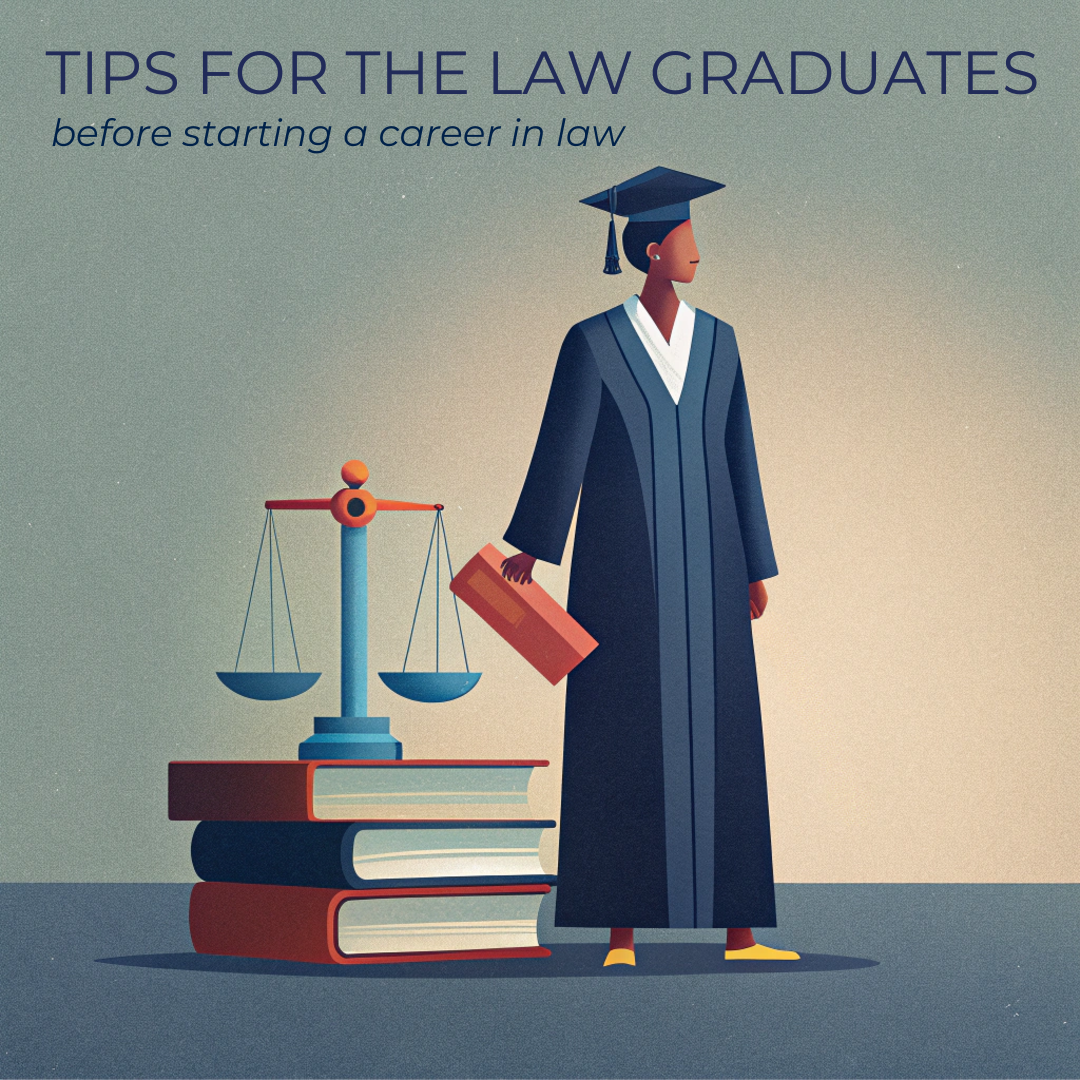Overview:
- The blog provides tips for professional careers in the law field and for pursuing higher education.
- Internships, building new skills and networking are key elements of success in the law field.
- AI & Technology are useful aids that must be used wisely.
Introduction
The field of law is both interesting and challenging at the same time. It is so because your work will motivate and cause you to learn new things and do better every day. Similar to any other field of work, learning never stops in the field of law. Apart from the work learnings, every fresher law graduate should know these things before joining the professional legal field.
1. Experience & Knowledge
- The more experienced you are in the legal field, the better you’ll be at handling responsibilities.
- Internships are the best place to learn the practicalities of your desired field in law. The sooner you start interning during the years of your degree, the better!
- The field of law is vast and it provides a wide range of career opportunities to law graduates. Internships can help you understand which is the field of law where your interest lies the most. Knowing your desired field of law early on will enable you to learn relevant skills and build your CV accordingly.
- Having clarity on what field you would like to join will also make your job hunt more focused.
2. Strategies for Job Applications and Effective Networking
Prepare for Multiple Job Applications and Cultivate Patience
- There is no softer way of putting this biggest reality check that the field of law has to offer. It is important to make your CV stand out and be creative with your applications but most importantly, be patient!
- It is always good to start applying for part-time opportunities/internships before your degree ends. There is always a chance of such part-time opportunities reforming into full-time jobs on request. But even if it doesn’t, you still get an experience and add-on to your CV. The best part is that in either case, it gives you a head start over others.

Be thorough in your Desired Field
- Being thorough in your desired field means to be aware of what your field expects, and what work is involved. This helps in assessing relevancy of your skills to the field and what other skills you need to learn.
- Nobody expects a fresher to know their career field inside out, but you’ll be expected to be good with law! So have a good command of laws & regulations, build skills and you’ll be good to go.
Build Connections/do Networking
- As a fresher, you should always interact with new people with similar interests. However, irrespective of their field, having a genuine interaction with someone and following up on it is good networking.
- As a fresher you can also build connections with people that you meet through your interview process. It could be a candidate that you met or the interviewer itself! It doesn’t necessarily ensure you getting the job, but a genuine attempt at building connections can go a long way.
- When you start networking as a fresher, with years it becomes your habit to make professional yet wholesome connections. Along With networking, you should also ace the art of communicating better at the workplace.
3. Be Research Affluent & Tech-Smart
- You may choose corporate sector, litigation, become an advisor, or join academia but legal research will never leave your side.

- Like research work, drafting is also common in every sector of law. Good research work will lead to finer drafting of contracts, briefs, research papers etc.
- It is my experience that the more research you conduct, the better you get at it. You can always join research workshops as well, as honing your research skills is crucial in this field!
- Nowadays, every profession and field of work is becoming tech-smart. Even the filing of documents in court is done online. In any field of law, you’ll find the use of various computer programs but mostly of MS-Office. Knowing and using its features, and shortcuts will make your work easier and more efficient.
- Many companies have ‘skilled in MS-Office’ in their job requirements so your chances of getting hired may also increase.
- Your research and data analysis skills, and familiarity with court websites are some of the things that support your candidature.

- AI has made work in the legal field very easy, starting from case research to data analysis, evidence assessment etc. It is good to use AI as it saves a lot of time and brings precision to the work. However, using it do all tasks may show a lack of creativity.
- Legal research with AI also necessitates ensuring the accuracy of the search result and the reliability of the AI tool. This is essential as sometimes with less credible AI tools, search results may be made-up.
4. Updating your Knowledge
- Like I said in the early paragraphs, learning never stops in the field of law. Keeping yourself updated with newly introduced or amended laws and landmark judgments makes you aware of the ongoing provisions.
- This will also help you while interacting with new people from the law field.

Pursuing Higher Education
- It is not compulsory to pursue higher education after your bachelor’s degree. However, it can be a remarkable addition to your qualifications. Pursuing higher education will surely allow you to delve deeper into the area of your specialization.
- People who wish to join academia need to pursue higher education per the posts’ requirements. If a job that you want to apply for doesn’t require a higher qualification, you may drop the idea. However, you always have the option to pursue it later in life.
Conclusion
The journey of working in your chosen field of law after graduation is thrilling. The field of law lets you learn and grow everyday. Once you embark on this journey, some interesting work awaits you. Keeping these tips for success in mind (and on your CV), be confident and ready to join the field.
FAQs:
What are the career opportunities in the law field?
Law has opportunities in both litigation and non-litigation side. You may opt to practice law in courts as an attorney as a civil, family or criminal lawyer. You may work as a legal advisor individually or be a company’s legal advisor. With individuals and corporate entities choosing to resolve their disputes outside court, field of alternate dispute resolution is gaining momentum. Joining academia is also a bright career option for teaching enthusiasts.
How to choose a career field?
Be aware of what field of law interests you the most. Going through your law syllabus will help you understand what subject interests you the most. It is always recommended to choose a career field that you like and have a good command on.
What can raise my chances of getting a job in the law field?
Having a less complex, more formal, and highly organized CV will leave a lasting impact on your recruiter. Always do course, workshops etc. relevant to your job field as they become a highlight of your CV. A law student is also expected to speak well. With your eloquence and an impactful CV you can impress the interviewer and get your dream job.


